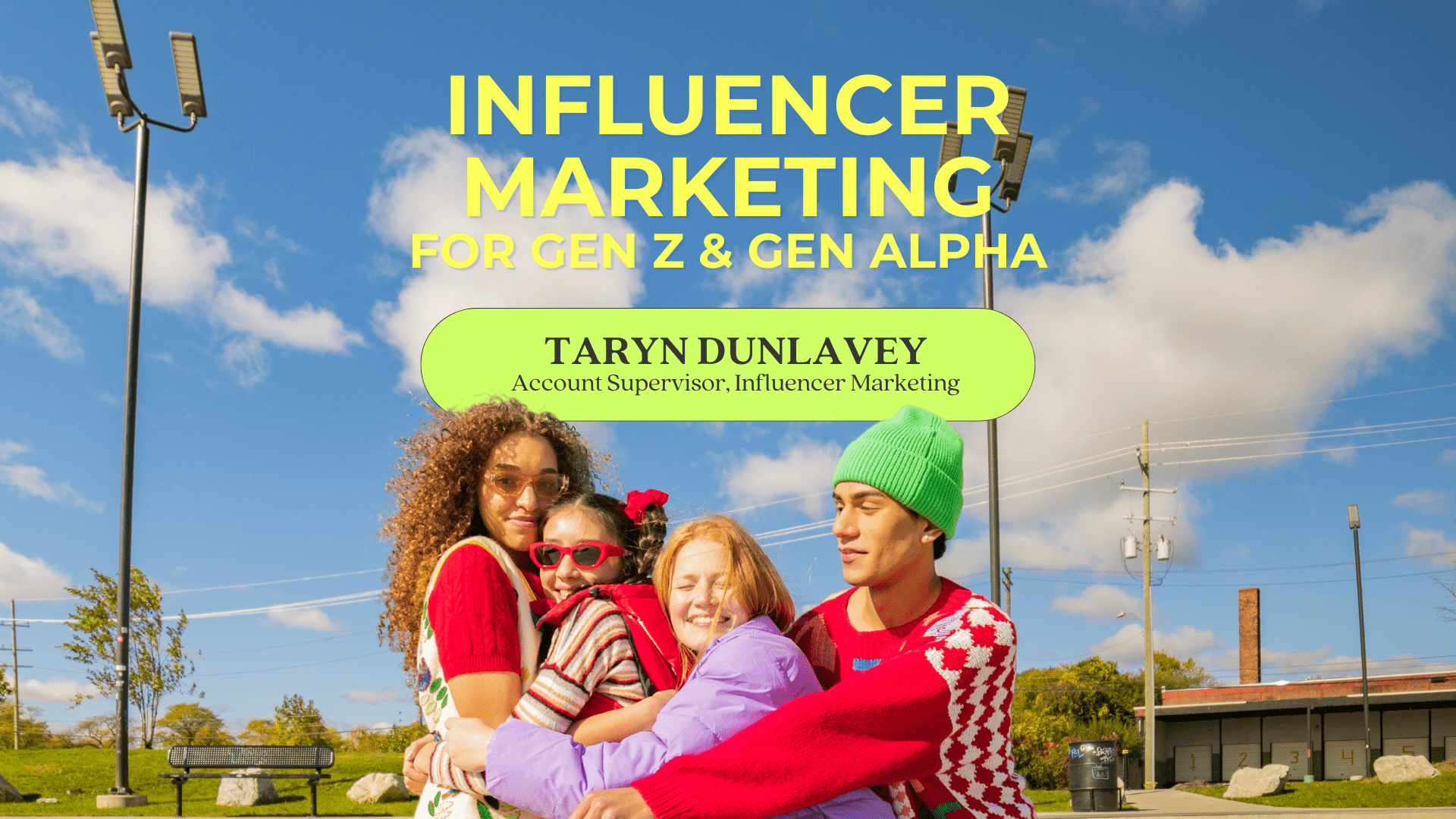
In today’s fast-paced digital landscape, brands face the unique challenge of engaging two of the most dynamic and influential generations: Gen Z and Gen Alpha. Born into a world dominated by technology, these young consumers have distinct characteristics that set them apart from previous generations.
Understanding how to connect with them is crucial for any brand looking to stay relevant and ahead of the curve. Influencer marketing has become a powerful tool for brands aiming to reach younger audiences.
Keep reading for tips on marketing to Gen Z and marketing to Gen Alpha through influencer marketing. We’ll also touch on the advantages of working with Gen Z and Gen Alpha influencers.
Gen Z, born between the mid-1990s and the early 2010s, represents one of the most digitally immersed generations in history. Growing up with smartphones, social media, and instant access to vast amounts of information, members of Gen Z are deeply connected to technology and the online world. This cohort is highly tech-savvy, seamlessly integrating digital tools into many aspects of their lives, from communication and education to entertainment and shopping.
Members of Gen Z are socially conscious and highly aware of global issues. They value authenticity, inclusivity, and transparency from the brands and institutions they support. They are more likely to engage with companies that demonstrate genuine commitment to social and environmental causes rather than merely paying lip service. This generation is also known for its entrepreneurial spirit and creative approach, often using digital platforms to launch businesses or advocate for causes they care about.
In terms of communication, Gen Z prefers direct and honest interactions, favoring platforms like TikTok and Instagram where they can engage with content that feels personal and relatable. They are quick to spot inauthenticity and are drawn to brands that reflect their values and offer real, meaningful engagement. As Gen Z continues to mature, their influence on technology, culture, and consumer behavior is expected to continue to grow, making them a crucial demographic for businesses and organizations to understand and connect with.
Generation Alpha, born from the early 2010s to the present, is the first generation to be entirely raised in the 21st century amidst a landscape of rapid technological advancements and shifting societal norms. As digital natives from birth, they are growing up surrounded by smart devices, AI, and ubiquitous connectivity, making them the most tech-savvy generation yet. This constant exposure to advanced technology shapes their expectations and interactions with the world, influencing everything from their learning experiences to their entertainment preferences.
Gen Alpha’s early years are marked by an environment rich in digital innovation and interactive experiences. They are accustomed to engaging with augmented reality, voice-activated assistants, and personalized digital content. This generation’s interaction with technology is not just passive but highly integrated into their daily lives, often blending physical and digital realms seamlessly.
Educationally, Gen Alpha is experiencing a shift towards more personalized and technology-driven learning environments. They benefit from tools that tailor educational content to their individual needs and learning styles, fostering a more engaging and effective learning experience. Socially, they are growing up in a more diverse and inclusive world, which is reflected in their expectations for representation and equality in media and consumer products.
As they continue to develop, Gen Alpha’s unique blend of technological immersion and evolving social attitudes will undoubtedly shape the future of communication, education, and consumer behavior. Marketing to Gen Alpha requires an understanding of their preferences and behavior. This is crucial for brands looking to connect with this influential generation effectively.

Below we dive into the key strategies for marketing to Gen Z and Gen Alpha, two digitally native generations with distinct behaviors and preferences. We’ll touch on what works best for each group, so you can tailor your approach and connect with these audiences more effectively.
Marketing to Gen Z starts with understanding their values. Here are some tips:
Be authentic. Gen Z can spot inauthenticity from a mile away. They value transparency and expect brands to be genuine in their messaging. Brands that build trust through honest communication and social responsibility initiatives are more likely to gain their loyalty.
Embrace diversity and inclusion. Gen Z is one of the most diverse generations. They expect the brands they support to reflect this diversity. Campaigns that celebrate different cultures, backgrounds, and identities resonate deeply with them.
Focus on social responsibility. Gen Z cares deeply about social and environmental issues. Brands that take a stand on issues like climate change, social justice, and ethical business practices are more likely to earn their respect and business.
Create interactive and immersive experiences. Gen Z appreciates experiences that are interactive and immersive, whether through augmented reality (AR), virtual reality (VR), or engaging digital content. Gamification is another way to capture their attention and encourage participation.
Here are some essential tips for effectively marketing to Gen Alpha, a generation that thrives on digital experiences and authenticity:
Prioritize personalization. Gen Alpha is growing up in a world where personalized content is the norm. Brands that offer tailored experiences, from personalized recommendations to custom content, will stand out in their eyes.
Engage through play. Gen Alpha characteristics include being heavily influenced by the gaming world, even from a young age. Incorporating elements of play and gamification into digital marketing strategies can create a sense of fun and engagement that resonates with them.
Create educational content. Parents of Gen Alpha are highly involved in their children’s media consumption, often preferring content that is educational as well as entertaining. Brands that create value by offering educational resources, whether through apps, content, or partnerships, can appeal to both Gen Alpha and their parents.
Use family-friendly marketing. Gen Alpha is still young, so their parents hold significant influence over their purchasing decisions. Marketing strategies that appeal to both children and their parents, emphasizing family values and safety, may be more effective.

Connecting with Gen Z and Gen Alpha through influencer marketing requires a strategic approach that aligns with their values and digital habits. These digital natives trust and follow influencers who resonate with their values, interests, and lifestyles. But connecting with these generations requires more than just traditional advertising methods. To truly engage them, brands must leverage influencers who can authentically speak to their audience’s unique perspectives.
Influencers who embody these values have the power to sway their opinions and shape their purchasing decisions. For these generations, influencers are not just celebrities; they are trusted sources of information, inspiration, and entertainment.
For Gen Z, authenticity is paramount. They seek influencers who are genuine, transparent, and aligned with their own values. Gen Z influencers are known for their ability to connect with their audiences in an authentic way. Unlike previous generations, who might have been drawn to perfectly curated content, Gen Z values raw, unfiltered, and real-life experiences. They are drawn to influencers who are relatable, transparent, and true to themselves, which has led to the rise of “everyday” influencers who share their daily lives, struggles, and triumphs.
For brands, partnering with Gen Z influencers requires a shift in strategy. It’s no longer enough to just push a product; the brand’s values, ethics, and social impact are just as important. Gen Z expects the brands they support to be aligned with their beliefs and to take a stand on important issues. Influencers who are seen as socially conscious and authentic can drive brand loyalty and advocacy among their followers.
Moreover, Gen Z influencers are adept at creating content that resonates across multiple platforms, from TikTok and Instagram to YouTube and emerging social media spaces. Their ability to quickly adapt to new trends and technologies makes them essential partners for brands looking to stay relevant.
When it comes to Gen Alpha characteristics, influencer marketing needs to be even more innovative. This generation, growing up with interactive technology, responds well to immersive and creative content. Influencers who can integrate augmented reality, interactive challenges, or educational content into their posts will capture their attention more effectively. Brands should focus on influencers who can create engaging, educational, and fun content that speaks to Gen Alpha’s interests and developmental stage.
Working with Gen Z influencers is one of the smartest moves you can make for your brand right now. Gen Z grew up with smartphones, social media, and an always-online mentality, which means they know exactly how to engage with digital content.
They’re experts in creating short, snappy, and impactful posts that feel authentic, which is exactly what today’s consumers crave. If you’re looking to reach younger audiences in an organic way, Gen Z influencers can help you do just that.
Brands in industries like fashion, beauty, and tech benefit greatly from partnering with Gen Z influencers. If you’re in fashion, for example, these influencers can style your products in everyday settings, showing their followers how to incorporate your brand into their own lives.
Beauty brands can also take advantage of this generation’s love for tutorials and product reviews, where Gen Z influencers break down their skincare routines or makeup looks, giving you honest, relatable exposure.
Tech brands are also finding success by working with Gen Z influencers. Whether it’s the latest app, gadget, or gaming gear, Gen Z knows how to showcase technology in a way that makes it appealing to their audience. They know what their followers want and how to explain it to them in a way that’s understandable and exciting. This generation is all about exploring new tech and integrating it into their daily routines, making it easier for your brand to capture attention.
Gen Z influencers are about issues like sustainability, diversity, and mental health, and they expect the brands they work with to align with those values. If your brand has a strong message or purpose, Gen Z influencers can be the perfect ambassadors to share that with their audience, elevating your brand while making a genuine connection with their followers.
Gen Alpha influencers have grown up with social media as a natural part of their daily lives. They are digital natives in the truest sense, often learning to swipe a screen before they can speak. Platforms like TikTok, YouTube, and Instagram are their playgrounds, where they create content that resonates with their peers and even older generations.
What makes Gen Alpha influencers stand out is their creativity. Unburdened by the expectations that come with age, they bring a fresh, unfiltered perspective to content creation. Whether they’re sharing their thoughts on the latest toys, demonstrating new dance moves, or simply showcasing their daily lives, their content feels real and relatable.
Moreover, Gen Alpha influencers’ audiences aren’t limited to just other kids. Their content often resonates with parents and older siblings, making them valuable voices in family-oriented marketing strategies. For marketers, Gen Alpha influencers represent a unique opportunity.
Collaborating with these young influencers allows brands to tap into trends early and stay ahead of the curve. However, it also requires a delicate approach, given the age of Gen Alpha influencers and the need for responsible marketing practices. Keep in mind, the eldest members of Gen Alpha are just 14 years old!
Gen Alpha influencers are more than just a trend; they are a glimpse into the future of digital influence. As they continue to grow and evolve, their impact on the digital landscape will only become more significant.
Gen Alpha influencers may be young, but their ability to connect with peers and younger audiences is powerful. If you want to tap into the next wave of digital consumers, working with Gen Alpha influencers is the smart move.
Brands in industries like toys, gaming, fashion, and tech can particularly benefit from this partnership. Imagine launching a new toy or game and having Gen Alpha influencers review it on YouTube or TikTok. Their followers, often peers or younger kids, are more likely to trust a recommendation coming from someone their own age rather than a traditional celebrity.
Similarly, fashion brands targeting kids and pre-teens can use Gen Alpha influencers to show off their latest collections, making those items instantly relatable and desirable. Whether it’s the latest gadget, app, or educational tool, Gen Alpha influencers can show other kids how fun or useful your product is, translating into high engagement and increased sales. They understand what grabs their audience’s attention—because they are their audience.
For brands and marketers, understanding and engaging with this generation is key to staying relevant in an ever-changing digital world.

Here are some key ways you can ensure your influencer campaign is successful:
Authenticity is key when it comes to connecting with Gen Z and Gen Alpha. These generations can easily detect inauthenticity, and they are quick to dismiss brands that come across as disingenuous. Partnering with influencers who genuinely believe in your product and align with your brand’s values is crucial. Influencers who openly share their experiences, challenges, and values are more likely to connect with these audiences on a deeper level.
While macro influencers and celebrities have massive followings, micro influencers (those with smaller, more niche audiences) often have higher engagement rates and a more loyal following. Gen Z and Gen Alpha are drawn to influencers who are relatable and accessible. Micro influencers tend to have a closer relationship with their followers, making their recommendations more trusted and impactful.
Video is the preferred content format for both Gen Z and Gen Alpha. Platforms like TikTok, YouTube, and Instagram are dominated by short, engaging videos that capture attention quickly. Influencers who create compelling video content—whether it’s tutorials, challenges, or behind-the-scenes glimpses—are more likely to resonate with these generations. Brands should collaborate with influencers to produce video content that is creative, authentic, and tailored to the platform.
Gen Z and Gen Alpha are highly diverse and value inclusivity. They expect the influencers they follow to represent a wide range of backgrounds, cultures, and identities. Brands should seek out influencers who embody this diversity and can speak to the experiences and perspectives of different communities. By doing so, brands not only connect with a broader audience but also demonstrate their commitment to inclusivity.
Interactivity is a key component of engaging with younger audiences. Influencers who create content that encourages participation—such as polls, quizzes, challenges, and games—can drive higher engagement and build a sense of community among their followers. For Gen Alpha, in particular, gamified content is especially appealing, as it taps into their love for play and learning.
Both Gen Z and Gen Alpha are passionate about social and environmental issues. They are more likely to support brands and influencers who take a stand on the issues that matter to them, whether it’s climate change, social justice, or mental health. Collaborating with influencers who are vocal about these causes can help brands build trust and loyalty with these socially conscious generations.
While platforms like Instagram and YouTube remain popular, new social media platforms are constantly emerging. Gen Z and Gen Alpha are often early adopters of these platforms, making them ideal for reaching younger audiences in innovative ways. Brands should stay ahead of the curve by experimenting with new platforms and working with influencers who are already gaining traction on them.
Instead of one-off collaborations, brands should consider building long-term relationships with influencers. Long-term partnerships allow influencers to authentically integrate a brand into their content over time, making it feel more organic and trustworthy to their audience. This approach also helps build stronger brand loyalty among Gen Z and Gen Alpha.

Hiring an influencer marketing agency can be a game-changer when targeting Gen Z and Gen Alpha. These generations are incredibly savvy and discerning, with high expectations for authenticity and creativity in marketing.
The Socialfly influencer marketing team brings specialized expertise to the table, offering insights into the latest trends and platforms that resonate with these younger audiences. We have established relationships with influencers who already connect with Gen Z and Gen Alpha, ensuring that your brand message reaches the right people in the most impactful way.
Our agency offers a strategic advantage by crafting campaigns that are not only engaging but also data-driven, optimizing performance through analytics and A/B testing. We handle the complexities of influencer negotiations, content creation, and performance tracking, allowing you to focus on your core business while ensuring your marketing efforts are efficient and effective.
By leveraging our agency’s experience and resources, you can create authentic, innovative campaigns that captivate Gen Z and Gen Alpha, driving better results and maximizing your brand’s impact in a competitive digital landscape.
Influencers play a crucial role in shaping the opinions and behaviors of Gen Z and Gen Alpha. By choosing the right influencers—those who are authentic, diverse, and aligned with the values of these generations—and marketing agency, brands can create meaningful connections that drive engagement and loyalty. As social media continues to evolve, staying attuned to the preferences and behaviors of these young audiences will be essential for successful influencer marketing.
Interested in learning more about reaching Gen Z and Gen Alpha through influencer marketing? Reach out to our team of experts today!
Written By: Taryn Dunlavey, Account Supervisor, Influencer Marketing